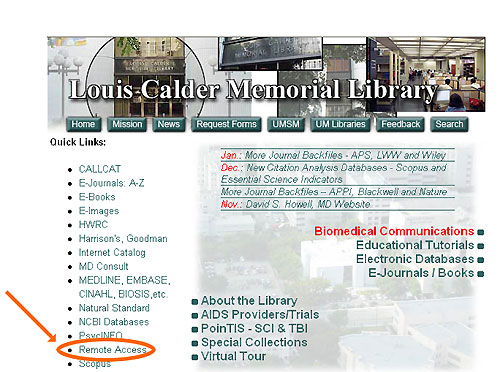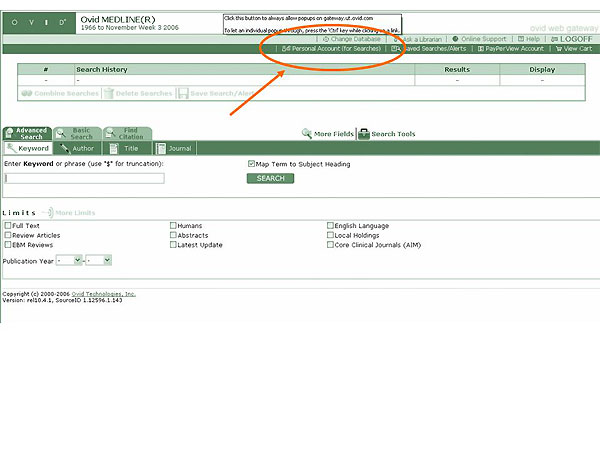 |
| |
| VOL. 27 NO. 6 |
November - December 2006 |
**** New Ovid Medline Password Needed ****
You need to create your own Personal Account to create and maintain Saved Searches and AutoAlerts in the Ovid Medline database. Don't delay! Your current UserID and password will soon be deactivated. Simple instructions for creating your new account and transferring your Saved Searches and AutoAlerts appear inside this issue. |
New Citation Analysis Databases
The ability to analyze recent citations and rank authors and institutions based on their publications has been sig-
nificantly enhanced with the addition of two databases: Scopus and Essential Science Indicators. These databases bring capabilities not previously available with the existing Web of Science and Journal Citation Reports databases.
Scopus (www.scopus.com/scopus/home.url), the newest and largest database of recent scientific/technical/medical literature, is produced by Elsevier and is now accessible University-wide. Scopus well supports:
- Searches by the many variations authors use in their names on their publications, as well as searches by institution and specific subject
- Analysis of search results for the past 10 years by top institutional authors and co-authors, journals in which articles appear, year, publication type, and broad subject category
- The ability to exclude self-citations and to export citations to RefWorks, a personal bibliographic management tool like End Note
Scopus includes:
- 5,300 health sciences titles, with broad coverage of the European literature and 100% coverage of Medline titles - about one-third of total Scopus journals
- 28 million records back to 1966 and more than 245 million cited references back to 1996
- Open access journals, conference proceedings, trade publications, book series, and 13 million patents
- Integration with Scirus.com, the web search engine for science, which indexes more than 200 million webpages and 1 million institutional repository documents
- A Tutorial at: help.scopus.com, and a Quick
Reference Guide at: info.scopus.com/setup/promo/promo_material/docs/scopus_qrg_
english.pdf.
Scopus is not the database of choice to analyze older citations (pre-1996), citations by medical specialty since "Clinical Medicine" is the narrowest category, or retrieval that exceeds 1,000 records. Web of Science is superior in these cases.
Essential Science Indicators (ESI), published by Thomson Scientific/ISI and accessible via Web of Knowledge (portal.isiknowledge.com), lets researchers "conduct ongoing, quantitative analyses of research performance and track trends in science. Covering a multidisciplinary selection of 11,000+ journals from around the world, this
in-depth analytical tool offers data for ranking scientists, institutions, countries, and journals...Available as a ten-year rolling file, ESI covers 10 million articles in 22 specific fields of research, and is updated every two months." Further information is accessible on the 'Information for New Users' link on the ESI website.
The Web of Knowledge portal continues to support:
Science Citation Index, the database of choice for:
- Older citation analysis (pre-1996)
- Detailed analysis at the author level by co-authors and areas of focus, and at the institutional level by medical specialty and basic science
- Determining impact on a field by citing authors, institutions, journals, and citation activity by year
- Analyzing retrieval of more than 1,000 and up to 100,000 citations
- Exporting references to EndNote
Journal Citation Reports, the sole source of journal impact factors by subject category.
back to top of page
New Journal Backfiles
APPI Psychiatry Legacy Collection, 1844-1997, includes all volumes of Academic Psychiatry, American Journal of Insanity, American Journal of Psychiatry, Hospital & Community Psychiatry, Journal of Neuropsychiatry and Clinical Neuro-sciences, Journal of Psychotherapy Practice and Research, Psychiatric Services, and Psychosomatics.
American Physiological Society Journal Legacy Content, 1898-1998, includes all volumes of American Journal of Physiology, Advances in Physiology Education, Journal of Applied Physiology, Journal of Neurophysiology, and Physiological Reviews.
Blackwell Legacy Complete Backfile Collection includes all volumes of more than 30 health sciences journals, such as Addiction, BJOG, British Journal of Dermatology, Clinical & Experimental Allergy, FEMS Immunology and Medical Microbiology, and Tissue Antigens. By the end of 2007, more than 50 additional titles will be
accessible, retrospective to volume one.
Lippincott Williams & Wilkins Legacy Collection, 1827-1999, includes the backfiles of 219 leading journals in a wide range of health sciences specialty areas, including nursing.
Nature Archive, 1987-1996, includes all volumes published between 1987 and 1996.
SAGE KE, Science of Aging Knowledge Environment Archive, October, 2001 through June, 2006, is now accessible, based on the University's Science online site license, to patrons who register for a personal username and password at https://pubs.aaas.org/register/reg_setup.asp from within the UM I.P. domain.
Wiley Interscience Backfile Collections, includes the backfiles of 180 journals in the biomedical sciences, 1834-1996.
The health sciences titles included in the above backfile collections are accessible on the E-Journals A-Z and CALLCAT links on the Library's website.
|
back to top of page
Database News
EndNote Web is a new option within Web of Knowledge that reduces to one step the process of searching Web of Knowledge, PubMed, and hundreds of online library catalogs and importing references, complete with abstracts, for subsequent editing, sharing via folders with colleagues or students, and/or transferring to the
desktop version of EndNote. The combination of EndNote Web and EndNote provides a robust personal
bibliographic management tool with a high.
Faculty of 1000 Biology now includes the new Pharmacology & Drug Discovery Faculty, with 26 new
subject sections, from Antimicrobial Agents to Toxicology, and 200 new Faculty Members, overseen by Floyd Bloom at the Scripps Research Institute and Paul Insel at the University of California San Diego. Faculty of 1000 Biology is a "global consensus map of the most important advances across biology," that includes opinions from the world's top researchers and offers e-mail alerts and stored searches based on your areas of interest.
MD Consult's new Images (from Books) enables searches of more than 50,000 images published in books. On MD Consult's new search page, click the "clear all" link and select the "Images (from Books)" option to restrict your search to e-images. MD Consult's Mosby's Drug Consult was replaced with Gold Standard Media's Clinical Pharmacology database, which includes nutritional and herbal products but lacks some drug information routinely available in the Mosby file.
RefShare allows RefWorks users to share their database or just specific folders from their RefWorks database with other users in the organization and, in some cases, even publicly. Simply go to the RefWorks toolbar and select either "Folder" and then "Share Folders" or "Tools" and then "Share References". Both options take you to the same place. For further information go to www.refworks.com/RWAthens/help/Sharing_your_Database.htm. RefWorks: Scopus Edition provides a sophisticated level of interoperability between RefWorks and Scopus, making it easy for researchers when retrieving and managing information. An unlimited number of records can be exported from Scopus to RefWorks without logging in first, and a RefWorks icon will appear in Scopus next to the records which have been exported to RefWorks.
SHERPA has added new features. RoMEO, a listing of publisher copyright policies now indicates publishers who comply with the NIH Public Access Policy. JULIET includes the open access mandates of research
funders. OpenDOAR enables searches of open access repositories and their contents.
UpToDate is working on three new specialties: Emergency Medicine (both adult and pediatric), Allergy and Immunology, and Neurology, and is adding new information as soon as it is edited and peer reviewed. Although neurological issues have been covered in the past, the material was written at the level of the non-neurologist.
Zoological Record includes more than 5,000 serials back to 1864, plus books, reports and meetings on animal biology, from biodiversity and the environment to taxonomy and veterinary sciences. For further information and training aids, go to www.scientific.thomson.com/support/products/zr/.
For additional information and/or assistance with any of these resources, please contact the Reference and Education Department at 305-243-6648. |
back to top of page
Off Campus Access to Electronic Resources
Reminder: Off-campus access to Calder's electronic resources is easy. Go to the "Remote Access" link under 'Quick Links', click on the first resource you wish to access, and enter your Calder Library username and barcode at the prompt. You will be able to access all electronic resources except UpToDate and you have to enter your username and barcode only once during each online session.
If you do not have a username and barcode, please go to the Circulation Desk on the first floor of the Library. Be sure and bring your UMMSM ID, necessary for remote access privileges and on which your barcode strip will be placed.

back to top of page
Ovid Introduces "Personal Accounts"
A new Ovid feature called "Personal Accounts" allows you to create and maintain "Saved Searches" and "AutoAlerts" in a secure and private work space.
To set up a Personal Account on-campus, simply click on the Personal Account button in the upper right corner of the Ovid window below and choose a Personal Account name and password. When you click on the "Save Search/Alert" icon at the bottom of the Search History box in an Ovid database, you will be prompted to sign on to an existing Personal Account or to establish a new one. Off-campus users must first access the Ovid database per the instructions on the back page of this issue.

To transfer existing saved searches and auto alerts to your new Personal account user name and password, once the new account is established, please provide the Library with the existing Ovid username and the newly-created username. Transfer normally takes twenty-four hours.
For additional information or to request the transfer of Saved Searches or AutoAlerts you can email us at: caldersystems@med.miami.edu or contact the Systems Department at 305-243-5530.
We encourage all users to create these new accounts as soon as possible. Access to the old style accounts will be suspended as of March 31st 2006.
back to top of page
|


